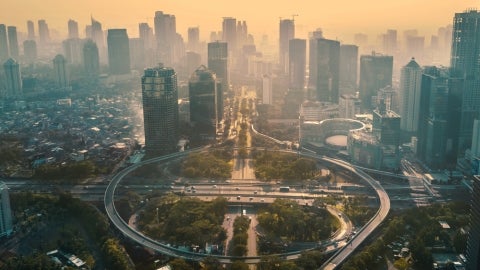More than half of the world’s population now lives in urban areas, creating about 80 percent of the world economy and 70 percent of global energy use and energy-related greenhouse gas emissions. Depending on whom you ask, this trend presents a valuable opportunity for innovation or a dire threat to achieving global sustainability.
A critical feature of this urbanization trend is the emergence of so-called “mega-urban” regions, or extended metropolitan areas, whose demands for resources and services create a widening range of environmental and socioeconomic impacts.
In
a Special Feature of the
Proceedings of the National Academy of Sciences, edited by Yale Professor
Karen C. Seto, some of the field’s leading thinkers examine the growing implications of global urbanization trends, including their impacts on resource use, potential environmental tradeoffs, and human wellbeing.
“The consequences of the large-scale urbanization occurring worldwide can potentially exceed those of the Industrial Revolution,” said Seto, the Frederick C. Hixon Professor of Geography and Urbanization Science at the Yale School of Forestry & Environmental Studies, editor and co-author of three articles in the issue.
“Given the magnitude of these trends, there is a need for new scientific knowledge on cross-scale interactions, tipping points, thresholds and limits so that we can orient urban development in a more sustainable manner.”
In six articles, the researchers identify three general themes:
1. Urban sustainability is inherently multidimensional and occurs at many scales. Therefore, solutions at one spatial scale or along one dimension — public health or biodiversity, for instance — may not have positive outcomes at other dimensions or scales.
For instance, local efforts to carefully manage urban development can protect agricultural land and reduce energy demands. But that won’t necessarily prevent adverse impacts on, say, biodiversity, as a consequence of wider scale land cover changes; Some desired outcomes come at the expense of other objectives.
This, researchers say, highlights the urgency for scientists to understand the trade-offs between often-competing environmental and socioeconomic goals. “However,” Seto said, “this represents an opportunity for researchers to identify areas where you can achieve improvements across multiple complex dimensions. Not necessarily to optimize these situations, but to
improve them.”
2. The effects of urbanization may only be observable if scientists consider them in the aggregate.
While urban studies have historically focused on individual cities, one at a time, researchers now recognize that they can only learn so much by increasing the number of observations, Seto said. Urbanization trends are happening in many cities simultaneously, so there is a growing urgency to understand the wider impacts of these trends.
“When we think about sustainability, at the end of the day we’re talking about planetary sustainability,” Seto said. “There’s no such thing as local sustainability because if you only think about your local environment you’re going to have unintended consequences elsewhere.”
In one of the new papers (“
Global urban signatures of phenotypic change in animal populations”), for instance, a research team led by Marina Alberti from the University of Washington reports that one of the major impacts of urbanization is its role in driving species evolution. This impact can affect ecosystem functions — such as food production, and carbon sequestration — with profound implications for humankind.
Another paper (“
Future urban land expansion and implications for global croplands”), led by Christopher Bren d’Amour of Mercator Research Institute on Global Commons and Climate Change (and co-authored by Seto), demonstrates how urban expansion will occur in some of the world’s most productive croplands — particularly in ”mega-urban” regions in Asia and Africa.
3. There is an urgent need for quantitative measures that consider both ecological and social processes.
In one of the articles in the issue (“
Urban sustainability in an age of enduring inequalities”], Robert J. Sampson of Harvard University examines how multidimensional inequalities common in contemporary cities — including Boston, Chicago, and Los Angeles — affect urban sustainability. As he points out, much research on urban sustainability is focused on environmental dimensions more than societal ones.
In another paper (“
Heterogeneity and scale of sustainable development in cities”), a team of researchers led by Christa Brelsford from the Santa Fe Institute construct a new metric that tracks sustainable development across multiple dimensions, which can help establish development priorities.
Global urbanization trends are transforming the planet and humankind’s relationship with it, creating an urgency to accelerate the transition to “sustainability.” “Urbanization presents a unique opportunity to make this transition while coupling social, economic, human development,” Seto and her colleagues write in
the introductory paper. “The challenge is whether science can deliver.”
 With a population of roughly 11 million, Jakarta is one of the world's largest cities.
With a population of roughly 11 million, Jakarta is one of the world's largest cities.